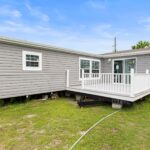Lakefront property often conjures images of serene waters, breathtaking views, and a tranquil lifestyle. While owning a home by the lake offers numerous advantages, including recreational opportunities, scenic beauty, and a potential boost in property value, there are also several disadvantages to consider. Here, we delve into some of the less appealing aspects of lakefront property ownership.
High Costs
Owning lakefront property typically comes with a higher price tag than comparable inland homes. The premium for the view and access to water can significantly inflate the initial purchase price. Additionally, property taxes tend to be higher for waterfront properties, and insurance costs can also be steep due to the increased risk of flooding or water damage.
Environmental Risks and Regulations
Living close to a body of water carries inherent environmental risks, such as flooding, which can cause property damage and require costly repairs.
Moreover, lake levels can fluctuate significantly, affecting access to the water and the usability of the property. Erosion is another concern, potentially threatening the stability of the property over time.
Lakefront properties are often subject to strict environmental regulations aimed at preserving the water quality and natural habitat. These regulations can limit what homeowners can do with their property, including restrictions on building, landscaping, and even the type of boats that can be used on the lake.
Privacy Concerns
Lakefront homes can sometimes offer less privacy than those inland. Public access to the water can mean a steady flow of people near your property, especially if your home is adjacent to a popular spot. Additionally, water carries sound, so noise from neighbors or recreational activities on the lake can travel easily.
Maintenance Challenges
Homes by the lake are exposed to a unique set of maintenance challenges. The proximity to water can lead to higher humidity levels, contributing to mold and mildew growth. Wooden structures, such as docks and decks, may require more frequent maintenance due to wear from the water and exposure to the elements. Additionally, the risk of pest infestations, such as mosquitoes or aquatic rodents, can be higher.
Limited Use Depending on Season
Depending on the location, lakefront properties can have limited usability during certain times of the year. In colder climates, lakes can freeze over in the winter, limiting recreational activities and access. Conversely, in areas prone to drought, water levels can drop significantly, affecting the aesthetic appeal and recreational opportunities offered by the lake.
Accessibility and Convenience
While the secluded nature of lakefront homes can be a draw for some, it can also mean being further away from urban amenities such as shopping, dining, and healthcare facilities. This can be particularly challenging for those who value convenience or require regular access to city services.
Lakefront living offers a unique lifestyle that many find irresistible. However, potential buyers should carefully consider the disadvantages, including high costs, environmental risks, privacy concerns, maintenance challenges, seasonal limitations, and accessibility issues. Understanding these factors can help in making an informed decision about whether lakefront property ownership aligns with one’s lifestyle and financial goals.
Living by a lake can seem like a dream come true, offering serene views, direct access to water activities, and a peaceful lifestyle away from the hustle and bustle of the city. However, owning lakefront property comes with its own set of challenges and disadvantages. It’s important for potential buyers to consider these factors before making a decision. Here are some of the key disadvantages of owning lakefront property:
High Costs
Purchase Price: Lakefront properties often come with a premium price tag due to their desirable location.
Insurance: Homeowners insurance can be higher for lakefront properties due to the increased risk of flooding and other water-related damages.
Maintenance: The cost of maintaining a lakefront home can be higher, from erosion control to dock repairs.
Environmental and Weather Concerns
Flooding: Properties near water bodies are at a higher risk of flooding, especially during heavy rainfall or snowmelt.
Erosion: Waterfront erosion can threaten the stability of your property and require expensive mitigation measures.
Severe Weather: Being close to a large body of water can sometimes mean more exposure to severe weather, such as storms or hurricanes.
Privacy Issues
Lakefront homes are often sought after for vacation rentals and tourism, which can lead to a high turnover of neighbors and less privacy, especially during peak seasons.
Accessibility and Isolation
Accessibility: Some lakefront properties might be located in remote areas, making access to amenities, healthcare, and other services more difficult.
Isolation: The serene and isolated nature of lakefront living might not appeal to everyone, especially those who enjoy the social aspects of city life.
Restrictions and Regulations
Building Restrictions: There may be strict zoning laws and environmental regulations that limit modifications or additions to the property.
Lake Use Restrictions: Access to the lake might be regulated, including restrictions on boating, fishing, and other activities.
Insects and Wildlife
Proximity to water bodies often means a higher presence of insects, such as mosquitoes, and potentially more encounters with wildlife, which could be a nuisance or even pose risks.
Environmental Impact
Living close to a natural habitat requires a greater awareness and responsibility towards maintaining its health and sustainability. The impact of human activities on the lake and its ecosystem can be significant.
Limited Expansion Options
Due to environmental regulations and the physical limitations of being close to water, there may be significant restrictions on how much you can expand or alter your property.
While the allure of lakefront living is undeniable, it comes with a unique set of challenges that potential homeowners should carefully consider. From the financial implications to environmental concerns, it’s important to weigh these disadvantages against the benefits of living by the lake. Doing thorough research and considering your long-term lifestyle preferences can help ensure that you make an informed decision that best suits your needs.
Community and Lifestyle Adjustments
Living in a lakefront community often requires adapting to a lifestyle that might be significantly different from urban or suburban living. The pace of life can be slower, and depending on the location, you might find fewer cultural and recreational facilities or events. For those accustomed to a bustling city life, this adjustment can be challenging.
Water Quality and Usage Issues
Water quality in the lake can fluctuate due to various factors, including pollution, algae blooms, and the presence of invasive species. These issues can affect not just the aesthetic and recreational value of the property but also have broader environmental impacts. Additionally, water levels in the lake may vary throughout the year due to weather patterns and water management policies, potentially affecting the usability of the property for certain activities.
Noise Levels
While many seek lakefront properties for their tranquility, noise can sometimes be an issue. This can come from recreational activities on the lake, such as boating and jet skiing, especially during peak seasons. The sound carries over water more clearly than over land, which can amplify noise levels and disrupt the peaceful setting you might be seeking.
Infrastructure and Services
The availability and quality of infrastructure and services such as roads, utilities, internet, and cell phone coverage can be limited or less reliable in remote lakefront areas. This can affect everything from daily convenience to the ability to work remotely or stay connected with friends and family.
Investment Risk
While waterfront properties can be excellent investments due to their limited supply and high demand, they also come with risks. Market trends can fluctuate, and properties might be more vulnerable to changes in the environment or regulations that can affect their value. Additionally, the potential impact of climate change on weather patterns and water levels poses a long-term risk that should be considered.
Complexity of Ownership
Owning a lakefront property often involves navigating a complex web of legalities, from understanding water rights to complying with local, state, and federal regulations that govern land and water use. For those not familiar with these aspects, it can add an unexpected layer of complexity to property ownership.
Owning lakefront property is a dream for many, but it’s essential to go into such a significant investment with eyes wide open to the potential downsides. While the disadvantages outlined above can pose challenges, they don’t necessarily outweigh the benefits for everyone. Prospective buyers should conduct thorough due diligence, consider their long-term lifestyle goals, and possibly consult with real estate professionals familiar with waterfront properties to make the most informed decision possible.







